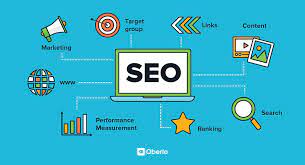
Search Engine Optimization (SEO) advertising is a crucial component of any successful digital marketing strategy. By optimizing your website and content for search engines, you can improve your online visibility and drive targeted traffic to your site.
SEO advertising involves a variety of techniques, including keyword research, on-page optimization, link building, and content creation. By implementing these strategies effectively, you can increase your website’s ranking in search engine results pages (SERPs) and attract more potential customers.
One of the key benefits of SEO advertising is its long-term impact. Unlike paid advertising, which stops generating traffic once the budget runs out, SEO efforts can continue to drive organic traffic to your site for months or even years after implementation.
Furthermore, SEO advertising allows you to target specific keywords and phrases that are relevant to your business. This means that you can reach users who are actively searching for products or services like yours, increasing the likelihood of converting them into customers.
Another advantage of SEO advertising is its cost-effectiveness. While it may require an initial investment of time and resources to optimize your site, the long-term benefits far outweigh the costs. Compared to traditional advertising methods, such as print or TV ads, SEO offers a higher return on investment and better targeting capabilities.
In conclusion, SEO advertising is a powerful tool for boosting your online presence and driving qualified traffic to your website. By investing in SEO strategies that align with your business goals, you can enhance your visibility in search engine results and attract valuable leads that convert into customers.
SEO, or Search Engine Optimization, is a digital marketing strategy aimed at improving a website’s visibility in search engine results. It involves optimizing various elements of a website, such as content, keywords, meta tags, and backlinks, to rank higher in search engine rankings. SEO works by helping search engines understand the relevance and quality of a website’s content so that it can be displayed to users searching for related information. By implementing SEO techniques effectively, businesses can increase organic traffic to their websites and reach a wider audience of potential customers.
To advertise in SEO, businesses can utilize a variety of strategies to enhance their online visibility and attract targeted traffic to their websites. Key tactics include conducting thorough keyword research to identify relevant search terms, optimizing website content with these keywords, building high-quality backlinks from reputable sites, and creating valuable and engaging content that resonates with both users and search engines. Additionally, businesses can leverage local SEO techniques, such as claiming and optimizing Google My Business listings, to improve their visibility in local search results. By implementing a holistic SEO advertising approach that encompasses these strategies, businesses can effectively promote their products or services online and drive organic traffic to their websites.
SEO in advertising refers to the practice of optimizing digital content and websites to improve their visibility in search engine results. Essentially, SEO advertising involves using strategic techniques such as keyword research, on-page optimization, and link building to enhance a website’s ranking on search engine results pages (SERPs). By incorporating SEO principles into advertising efforts, businesses can attract more organic traffic, target specific keywords relevant to their products or services, and ultimately increase their online presence and visibility to potential customers. In essence, SEO in advertising is about leveraging search engine optimization strategies to enhance the effectiveness of online marketing campaigns and drive valuable traffic to a website.
When it comes to SEO, there are four main types that are commonly recognized: on-page SEO, off-page SEO, technical SEO, and local SEO. On-page SEO focuses on optimizing individual web pages to improve their search engine rankings and attract organic traffic. Off-page SEO involves activities outside of your website, such as link building and social media marketing, to enhance your site’s authority and credibility. Technical SEO deals with the technical aspects of your website, such as site speed and mobile-friendliness, to ensure optimal performance in search results. Local SEO targets geographically specific searches to help businesses attract local customers. Each type of SEO plays a crucial role in improving a website’s visibility and driving relevant traffic.
To effectively implement SEO marketing, it is essential to start with thorough keyword research to identify relevant search terms that your target audience is using. Next, optimize your website’s on-page elements such as meta tags, headings, and content to align with those keywords. Building high-quality backlinks from reputable websites and creating engaging, informative content that resonates with your audience are also crucial aspects of SEO marketing. Regularly monitoring and analyzing performance metrics, adjusting strategies based on data insights, and staying updated on search engine algorithms are key to maintaining a successful SEO marketing campaign.